Texting and driving have received much media coverage in recent years, along with drinking while operating a vehicle. Yet another danger can lie in getting enough sleep: not doing so may put drivers at risk.
Studies have demonstrated that sleep deprivation affects a driver’s reaction time and decision-making just like alcohol can, providing compelling evidence of sleep issues is crucial in successfully defending DUI charges.
1. Research shows that drowsy drivers are more likely to be involved in accidents
People may not realize that driving while feeling drowsy poses serious risk to themselves and other roadway users. Studies show that drowsy driving can result in slower reaction times, impaired judgment and decreased awareness; these impairments make it harder to quickly respond to changing road conditions or take necessary actions such as braking or swerving when needed to avoid an accident. Drowsy drivers may even lose control of their vehicles leading to accidents that result in serious injuries or deaths.
Researchers conducted a recent study that concluded drowsiness plays a significant role in car crashes, with sleep-related accidents outnumbering government statistics by an astounding margin. According to AAA Foundation for Traffic Safety research, up to 16% of police-reported motor vehicle collisions involve drowsy drivers compared with just 2% among sober drivers. Furthermore, recent research suggests those driving while tired are twice as likely to crash than sober drivers.
Drowsy drivers are at greater risk for fatal crashes and tend to crash at higher speeds than other motorists. Crash rates among people getting less than seven hours of sleep is even worse and could approach that seen among drunk drivers; chronically sleep-deprived individuals also tend to experience more instances of drowsy driving with reduced awareness of fatigue than others.
2. Drowsy drivers are more likely to be arrested for DUI
Drowsy driving accounts for a substantial proportion of vehicle collisions and has been shown to impair judgment, decision-making, coordination and vigilance of drivers, which may result in fatal accidents with serious injuries sustained and property damaged as a result. Collisions caused by sleepy drivers can have devastating financial repercussions for everyone involved – medical expenses incurred, vehicle repair or replacement expenses and higher insurance premiums just being some.
Many states dedicate weeks or days to raising awareness of drowsy driving’s dangers, yet many motorists still fail to acknowledge its serious implications. Sleep is essential to living healthily but when working long shifts or living in bustling urban environments it can easily fall by the wayside.
Drowsy driving can be prevented by prioritizing sleep, being aware of potential warning signs, and taking proactive steps to stay alert while on the road. If you find yourself becoming sleepy behind the wheel, try opening up some windows for fresh air or playing upbeat music to keep yourself awake and focused.
Police officers typically look out for signs that suggest drunk driving when stopping drivers, such as swerving, bloodshot eyes and slurred speech. Drowsy drivers exhibiting similar characteristics could also be arrested as lack of sleep causes similar impairment to alcohol consumption.
3. Drowsy drivers are more likely to be charged with DUI
Drowsy driving shares many similarities with drunk driving: both can lead to drivers drifting out of their lanes and off the road, missing traffic signals and red lights and impairing decision-making and judgment, leading to slow reflexes, difficulty breaking, slurred speech or even slow reflexes and difficulty in responding. Unfortunately, officers may mistake these behaviors as evidence of impairment resulting from alcohol or other substances present.
Some states have laws against drowsy driving, like New Jersey’s Maggie’s Law which makes sleepy driving a vehicular manslaughter offense, but many other states do not yet have similar legislation in place and prosecuting these cases can be more complex without clear legal provisions in place.
Simeone & Miller of New Jersey personal injury firm Simeone & Miller suggest technology could play an instrumental role here. He notes the increasing trend for cars to include sensors which detect when their driver becomes sleepy and beep to awaken them, which might help insurers keep an eye on this problem and potentially implement new rules on drowsy drivers. In the meantime, effective DUI defense strategies might include challenging the validity of field sobriety tests while offering expert testimony detailing how lack of sleep affects driving ability.
4. Drowsy drivers are more likely to be charged with DUI
Texting while driving and drunk driving have recently generated much discussion; yet another form of dangerous driving that often goes under-recognized is sleep-deprived driving. Sleepy drivers are just as dangerous; in fact, those who fall asleep at the wheel are significantly more likely to cause crashes that result in serious injuries and fatalities.
Drowsy driving doesn’t receive as much media coverage as distracted or drinking and driving due to it being hard for law enforcement officers to tell apart someone suffering from sleep deprivation from someone under the influence of alcohol. Many symptoms associated with drowsy driving (blurred vision, slow reflexes, poor coordination and lethargy) resemble signs of intoxication; thus leading to false accusations against drowsy drivers for DUI charges.
However, there are numerous strategies available to prevent drowsy driving. People working late shifts should avoid driving at night. Also, those taking certain medications should review any side effects that cause sleepiness to determine if this could cause issues for driving at night. Furthermore, those suffering from sleep disorders should seek treatment immediately and drivers should avoid drinking caffeinated beverages or smoking before driving and pull over and rest as soon as they feel too sleepy to safely navigate a highway.


